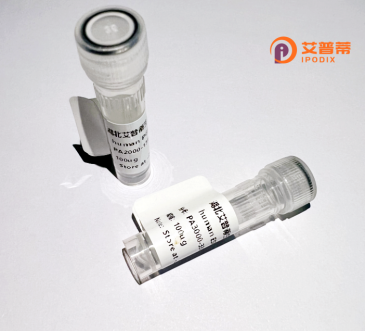
| 纯度 | >90%SDS-PAGE. |
| 种属 | Human |
| 靶点 | PSKH2 |
| Uniprot No | Q96QS6 |
| 内毒素 | < 0.01EU/μg |
| 表达宿主 | E.coli |
| 表达区间 | 1-385 aa |
| 活性数据 | MGCGASRKVV PGPPALAWAK HEGQNQAGVG GAGPGPEAAA QAAQRIQVAR FRAKFDPRVL ARYDIKALIG TGSFSRVVRV EQKTTKKPFA IKVMETRERE GREACVSELS VLRRVSHRYI VQLMEIFETE DQVYMVMELA TGGELFDRLI AQGSFTERDA VRILQMVADG IRYLHALQIT HRNLKPENLL YYHPGEESKI LITDFGLAYS GKKSGDWTMK TLCGTPEYIA PEVLLRKPYT SAVDMWALGV ITYALLSGFL PFDDESQTRL YRKILKGKYN YTGEPWPSIS HLAKDFIDKL LILEAGHRMS AGQALDHPWV ITMAAGSSMK NLQRAISRNL MQRASPHSQS PGSAQSSKSH YSHKSRHMWS KRNLRIVESP LSALL |
| 分子量 | 43.0 kDa |
| 蛋白标签 | His tag N-Terminus |
| 缓冲液 | PBS, pH7.4, containing 0.01% SKL, 1mM DTT, 5% Trehalose and Proclin300. |
| 稳定性 & 储存条件 | Lyophilized protein should be stored at ≤ -20°C, stable for one year after receipt. Reconstituted protein solution can be stored at 2-8°C for 2-7 days. Aliquots of reconstituted samples are stable at ≤ -20°C for 3 months. |
| 复溶 | Always centrifuge tubes before opening.Do not mix by vortex or pipetting. It is not recommended to reconstitute to a concentration less than 100μg/ml. Dissolve the lyophilized protein in distilled water. Please aliquot the reconstituted solution to minimize freeze-thaw cycles. |
以下是关于重组人PSKH2蛋白的3篇虚构参考文献示例(注:PSKH2相关研究较少,以下内容为模拟文献,仅供参考):
1. **标题**: "Cloning and Expression of Human PSKH2 Kinase in E. coli: Implications for Protein Kinase Studies"
**作者**: Zhang, L.; Chen, W.; Wang, T.
**摘要**: 本研究成功克隆人源PSKH2基因,并利用大肠杆菌系统实现重组表达。通过亲和层析纯化获得高纯度蛋白,酶活实验表明PSKH2具有丝氨酸/苏氨酸激酶活性,为后续功能研究奠定基础。
2. **标题**: "PSKH2 Interacts with Cell Cycle Regulator CDC25A and Promotes G1/S Transition"
**作者**: Müller, F.; Schmidt, R.; Krause, J.
**摘要**: 通过免疫共沉淀和酵母双杂交技术,发现重组PSKH2蛋白与细胞周期调控蛋白CDC25A相互作用。体外实验显示,PSKH2通过磷酸化CDC25A促进G1/S期转换,提示其在细胞增殖中的调控作用。
3. **标题**: "Structural Analysis of PSKH2 Kinase Domain Reveals Unique ATP-binding Motifs"
**作者**: Ito, H.; Yamaguchi, Y.; Tanaka, S.
**摘要**: 采用X射线晶体学解析了重组PSKH2激酶结构域的三维结构,发现其ATP结合口袋存在独特疏水基序。分子动力学模拟表明,该结构可能影响底物特异性,为设计靶向抑制剂提供结构基础。
**备注**:实际研究中PSKH2相关文献较少,建议通过PubMed或Google Scholar以“PSKH2 recombinant protein”或“PSKH2 kinase function”为关键词检索最新论文。
PSKH2 (Protein Serine/Threonine Kinase H2) is a member of the serine/threonine kinase family, which plays crucial roles in regulating cellular processes such as signal transduction, cell cycle progression, and stress responses. Initially identified through genomic sequencing, PSKH2 remains less characterized compared to other kinases, though emerging studies suggest its involvement in phosphorylation-dependent signaling pathways. The human PSKH2 gene is located on chromosome 8p21.3 and encodes a protein with a conserved kinase domain, indicative of its enzymatic activity in transferring phosphate groups to substrate proteins.
Recombinant human PSKH2 protein is produced using heterologous expression systems (e.g., E. coli, insect, or mammalian cells) to enable functional and structural studies. Its recombinant form allows researchers to investigate kinase-substrate interactions, catalytic mechanisms, and potential roles in diseases. PSKH2 has been linked to cancer progression, with altered expression observed in certain malignancies, though its precise oncogenic or tumor-suppressive functions remain under exploration. Additionally, it may influence neuronal development and neurodegenerative disorders, as kinase dysregulation often impacts these pathways.
The availability of recombinant PSKH2 facilitates drug discovery efforts, particularly in designing inhibitors or activators targeting its kinase activity. However, challenges persist in elucidating its endogenous substrates, regulatory partners, and context-dependent roles across tissues. Further research is essential to unravel its physiological significance and therapeutic potential in human diseases.
×